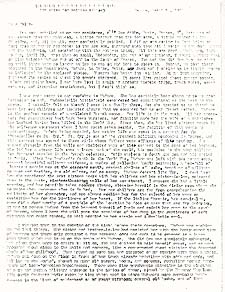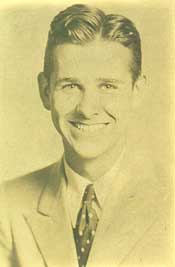
Letter from Paris, April 30, 1934
Click to enlarge Facsimile p. 1 (151k)
~
lalalalalalalalalalalalalalalalalala
(Practice for setting ribbon)
Monday, April 30, 1934
Dear Folks:
I'm now installed at my new residence, 4bis
Rue d'Ulm, Paris, France, Ve, just around the corner from the
Pantheon, a little farther from the Sorbonne, a little nearer
to the Glacière, and, all in all, very comfortably settled.
I did my own moving in four trips on foot from my former residence
to the new one, carrying each time all I could in the portmanteau
and the handgrip, and concluding with the antique trunk. All
this occurred a week ago, last Monday, April 23. From then on
until, Wednesday, the day of my birthday, I spent a great deal
of time helping Madame Pernot off to the South of France. She
and the Old One kept us right up until there were no longer tables
to eat on and beds to sleep in. Sunday, we took their pictures
in the Luxembourg, Madame, La Reine, Felix, Jack and I mixing
up in little groups as indicated by the enclosed photos. Observe
how heavy I'm getting. At my last weighing, I tipped the scales
at about 150 pounds stripped. It seems I've gained about twenty
pounds. Before returning home, I may have lost it again by arduous
bicycle trips, train rides, ocean voyages, and irregular nourishment,
but I don't think so.
I was very sorry to say good-bye to Madame.
She has certainly been charming to us from beginning to end.
Mademoiselle Littlefield considered her establishment as the
best in the group. I actually felt as though I were in a family
there, for she treated us as though we were her own children
and insisted always that we consider her as our French mother.
Madame is the perfect example of a well-bred French woman. Her
life is in the past. All her ancestors for generations back have
been warriors, and fatality made her the wife of a warrior--her
husband having been killed in the World War. Since then, she
has lived sixteen years in the self-same apartment where I have
spent seven months. The futility of that woman is extraordinary.
Before being married, her entire life was spent in a convent
for the "Demoiselles de St. Cyr." St. Cyr is one of
the greatest military academies in France, and this convent was
opened to those girls whose fathers were officers of the academy.
She passed abruptly from the walls and sheltered ways of the
convent to the arms of her husband, who led her a stormy life
over a large part of the world, his position in the army calling
for frequent service in the French colonies. Feliz was born in
South America and his sister in Paris. After her husband's death
in the World War, Madame was left with two young ones, several
beautiful military uniforms, a number of yellowing family portraits,
a box-full of lustrous medals won at the cannon's mouth, several
shelves of books treating of military science and tactics, two
old sabres, and no money. Madame doesn't like War. I dont know
how she weathered the next sixteen years with her children and
her sister-in-law, prisoned away in the dusty, nineteenth-century
walls of her appartment. I suppose she had a little pension,
and has possibly taken roomers always, sleeping herself in the
dining room where she scurries when everyone else is in bed.
Her own children are far from comprehending the sublimity of
her character, and are always mocking her for the naiveté
of her ways or exploiting her for the kindliness of her heart.
If the Italian Marquis, her son-in-law, ever did a deed worthy
of a particle of the boasting he does on many that are far inferior,
it was to rescue Madame from the haggard turmoil of Paris and
spirit her away to the south of France, where I hope she will
pass the remainder of her days in the gentleness of soft climates
and quiet places, so well merited by her simple and idealistic
soul.
I visited them in the evening of the night
before their departure. Madame was packing up the last things.
Her sister and brother-in-law had assisted her with the heavy
expedition of baggage and there only remained a few personal
odds and ends to be crammed in a large open trunk which was to
go on the train with Madame. The Old One was completely exhausted,
but since there were no chairs to sit on, she was obliged to
hold herself erect, and so went drooping about close to the walls
and corners, like a resurrected ghost visiting the deserted abode
of her childhood. They brewed me some tea and insisted on my
staying with them a while. Madame sat down on the floor in front
of her trunk already bristling with odds and ends, and talking
as she worked, showed me many old papers, books, and objects,
recalling former grandeurs and long-forgotten happinesses. There
were fine parchments attesting to the election of such and such
a military ancestor to the Legion of Honor, signed by the Emperor
Napoleon III; eagle feathers badly eaten by time which used to
adorn Madame's more sumptuous headdresses in the blush of maidenhood
or of young wifehood; several old books, one of them
-2-
dating back to the time of Molière,
Corneille, Racine--brilliant century of Louis XIV. Madame tenderly
deposited packets of letters and postcards, ribboned and dusty,
in the corners of the trunk, & showed me photographs of her
husband, always the biggest and most handsome man in each photo,
always wearing the most impressive mustache. Several revolvers
were put away next, many military hats, and a sabre that Madame
could scarcely hold out at arm's length with which her husband
had wounded another officer in a duel. I silently take off my
hat to any man who had arm enough and heart enough to swing that
gigantic sabre in a duel, for it was one of the most redoubtable,
long-bladed weapons that ever flashed above the battle-smoke
of a French cavalry charge. Several family portraits, ignominiously
rolled up in one, went in next, one or two half-destroyed albums,
some children's garments, and at length her husband's military
coat, with which I pleased Madame by showing that it was much
too big for me. Many poignant memories were exhaled from the
dust and clutter of the old trunk. She finally closed the lid
on it, shutting many a sigh with its contents.
I returned the next day twice, once in the
afternoon to take the last trunks to the station and help Madame
secure her tickets, once in the evening to see them off finally.
Along the boulevard that flanks the Seine, Madame made her last
ride with a full heart and tearful eyes. I don't believe she's
left Paris for 16 years. I finally got her through the station
control with all her baggage, and hustled her and the Old One
into an empty compartment of the train, where Madame nearly fainted
away every time the train whistle blew. I felt pretty sad when
I said good-bye to them. Madame said "Embrassez-moi, Frank,"
so I kissed her à la française. The Old One got
up for hers. The train started off, so I skipped out and stood
on the platform waving until they had gone. Then I returned to
my new appartment. I was twenty-years old that day, and it seemed
to me that in many ways I was just as big a baby as I had been
twenty years ago.
My new place is very nice--not as much freedom
with the family proper as at Madame Pernot's, but good meals,
and a nice room all to myself. The room, though not as large
as the one I inhabited before, is, all the same, nearly twice
as large as my room at home and very well furnished with a bed,
two small tables, one large writing table or desk, and a big
cabinet where I easily file all my things. There's an English
girl rooming at the house who sustains admirably her national
tradition of mumbling abominable French, but who is in other
ways a very charming personnage, plays the violin, dances, plays
cards, chews with her mouth closed, and conducts herself very
fashionably withal. Monsieur is a little man with a distinguished
air, completely tyrannized by his gross but good-natured wife,
and obliged to seek his compensation in harmless little witticisms,
ordinarily directed at the English girl--who has everything repeated
twice. The most animated character in the house is a little French
girl of six years, who seems to be staying with the Vincent family
for the time being. she speaks French with admirable purity,
and has set herself up as my instructor, reading to me out of
a little Mickey Mouse book, and explaining the pictures with
childish prolixity. Madame is very kindly, but lacks the sensibility
and natural refinement of Madame Pernot. Henry, the boy, is never
at home, always pretending to be on his way to important conferences
which he never attends. He doesn't seem to have any ambition
nor very much energy. The other boy, Maurice, is a fine, energetic
young man who is at this time serving his military period.
My school-work is prodigious just now and
perhaps will be until the end of the year. It may yet be weeks
before I have the opportunity to finish the record of my trip.
Mr. Brinton just threw a bomb-shell into everyone's plans by
ordaining the submission of the thesis for the 30th of May. I
have hardly more than broached mine, and the subject is such
that nothing short of 100 pages will suffice at minimum. With
this I am two dissertations behind, and about 30 letters. My
last dissertation received 18 and many compliments from my teacher.
That's the highest grade yet given. I hope the next two together
will be as high as that, for I'm going to write them breathlessly.
I have received all your letters, having changed
my address at the post office, so that all subsequent letters
posted to 19 Rue Soufflot would be received by me here. Thank
all the people who have remembered me in any way--by work or
letter--Tommy O'Haven, Wilma Stafford, Rob Keck, etc.
I'm glad that everyone at home is healthy.
Remember that I shall come all the way home on the money I now
have. I hope Dad will have high sailing in all his new connections.
More power to Baby Anne! Love to all,
Ross, Jr.
Back to Other Writings
 Back to Table of Contents
Back to Table of Contents
Email
Site managed by RIII
Web Page design by henley/graphics
Page last updated: Jan. 4, 2000
http://www.raintreecounty.com


